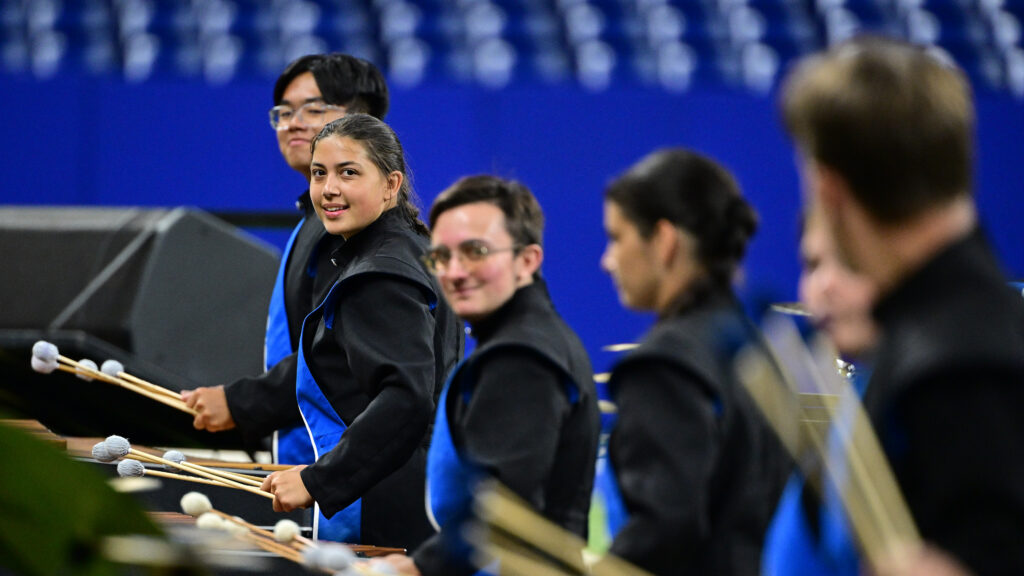
In 1997, Drum Corps International and Walt Disney World celebrated their silver anniversaries, and the presence of drum corps in the Orlando theme park was inescapable during the DCI World Championships, culminating with a parade of corps through Epcot. At the Citrus Bowl, Crossmen delivered its second-ever top-six placement, finishing just nine tenths of a point under Madison Scouts’ pirate themed show and just over a point down from Phantom Regiment’s homage to Wagner’s Ring Cycle. At the top, Blue Devils picked up its 9th DCI World Championship title with “As Time Goes By,” holding off the Cadets’ “Celebration” after the eastern corps had both tied and beaten the Devils during the two weeks prior. Santa Clara Vanguard, after starting off the season 9.5 points under the Blue Devils at the first show of the season, tied its fellow California rival for 1st place at the Quarterfinals before settling into 3rd place at the Semifinals and Finals competitions. Vanguard’s production title “Fog City Sketches” referenced one of the nicknames for San Francisco, reflecting upon the atmospheric haze that often rumbles off the ocean, enveloping the Golden Gate Bridge before settling upon the city. “On the Town,” which is best known for the hit song, “New York, New York,” was 26-year-old Leonard Bernstein’s first foray into musical theater, written in 1944 about three sailors on a 24-hour leave in New York City. Vanguard’s show opened up with “Pas de Deux” from “Lonely Town,” a ballet sequence that in the original production had a sailor lamenting his inability to find true love in the big city. Bernstein later chose this as one of the three works from the musical to be featured in “Three Dance Episodes” from “On the Town,” a popular symphonic treatment for both orchestra that was later arranged for concert band. “Pas de Deux” was in essence a ballet viewed by one of the sailors from within the musical, a work within a work. Capturing the loneliness of being in the big city without love, the corps started with just about everyone frozen in place on the football field as a handful of brass players mournfully stated the melancholy melody. What was fascinating for this era of drum corps was how long it took for the show to catch fire. The horns built up to a grand crescendo, but then let the music continue to simmer under the surface for most of the first two minutes. Just before the two-minute mark, the drums kicked in with “Presto Barbaro” from Bernstein’s “On the Waterfront,” a brutal work of percussive and brass explosiveness that captured the equally brutal passion and conviction of the 1954 movie directed by Elia Kazan that won eight Academy Awards. The movie followed the exploits of a longshoreman blowing the whistle on union corruption that permeated every facet of working on the docks and is ranked eighth on the American Film Institute’s list of the best American movies ever. Bernstein’s work places 22nd on AFI’s list of top American film scores.
After the bombast of the extreme musical violence, the corps played the “City Dreams” love theme from the movie. In the movie, it was first heard in the rooftop scene between the two doomed lovers and brought back at the end of the film in tragic glory. This movement allowed the color guard members in black evening gown-like costumes to milk every ounce of tension from the cloud of permeating apprehension that floated just above the surface of the field. Bernstein’s “Symphony No. 2 for Piano and Orchestra: The Age of Anxiety” was inspired by the 1948 Pulitzer Prize-winning poem by W.H. Auden. Set in a New York City bar during World War II, the poem explored “the quest to find substance and identity in a shifting and increasingly industrialized world.” Nowhere was this more evident than in the playfulness of “The Masque,” heard at the beginning of the accompanying video clip, and in the turbulent “Variation 14, Poco più vivace,” the soul-shattering section witnessed in the rest of the clip. It was in this latter segment that the corps vividly expressed the “anxiety” and deep state of personal confusion Bernstein so richly brought to his score. The repeated ascending lines under the melody particularly jumped out while listening to this show live. Vanguard’s closing piece, “The Epilogue” from the symphony, was one continuous crescendo out of the disarray of ending of the previous selection. It grew in intensity until the tension of the ever-increasingly musical drama was almost unbearable. At the penultimate climax, a long arc of horns slowly dissolved from within and formed a continuous squiggle with six arced peaks. That formation quickly collapsed inward to a 40-yard advancing company front that blew out to a large ending scatter. This final minute-and-a-half of music remains one of the single most hauntingly glorious and celebratory proclamations of everything drum corps can do to elevate the soul, lift the spirits and transport us to a far away realm.
For this week only, you can save on the Legacy Collection DVD that contains this complete Santa Clara Vanguard performance, along with all finalists from the 1997 DCI World Championships.
Buy the 1997 Legacy Collection DVD. (Available this week for 20% off. Regular price: $35.95.)
1997 Overview
Discount DVD offer ends Monday, Jan. 20.

Michael Boo was a member of the Cavaliers from 1975-1977. He has written about the drum corps activity for more than a quarter century and serves as a staff writer for various Drum Corps International projects. Boo has written for numerous other publications and has published an honors-winning book on the history of figure skating. As an accomplished composer, Boo holds a bachelor's degree in music education and a master's degree in music theory and composition. He resides in Chesterton, Ind.





